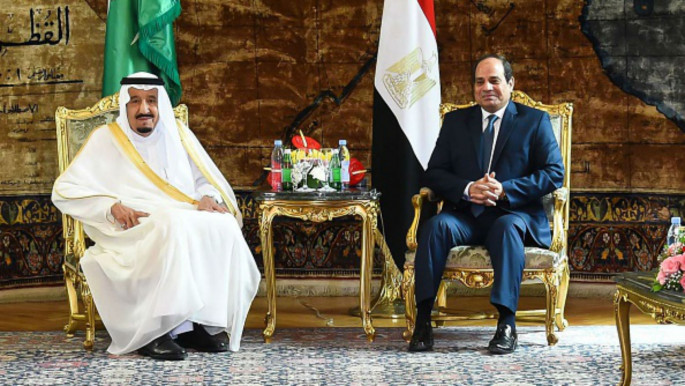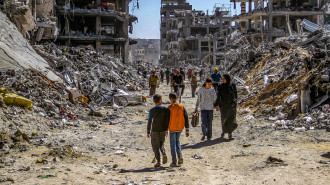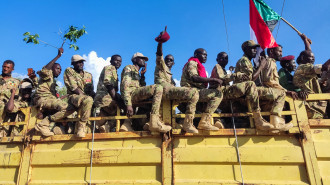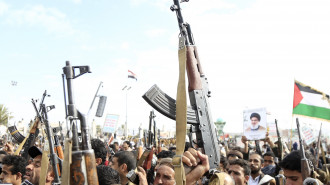Bleak economic outlook heralds further Middle East instability
Bleak economic outlook heralds further Middle East instability
Faced with wars, corruption and fluctuating commodity prices, the region's governments have been warned to brace themselves for further peril.
4 min read
The IMF's five-year outlook predicts woe for the region [Getty]
Countries across the Middle East and North Africa are faced with potential income losses of around $2 trillion over the next five years, threatening to throw the region into further political and social disarray.
This gloomy prediction came as part of the International Monetary Fund's annual Fiscal Monitor, which warned that the drop in oil, food and metal commodities will compel Middle Eastern governments to increase borrowing.
Oil sales and island trading
These forecasts come in a month that began with Saudi Arabia announcing a huge economic transformation to see it through to the post-oil era, as well as the selling off of a number of shares in Aramco's parent company.
Most recently, attempts to patch up the region's economic woes led to a multi-billion dollar investment deal agreed between King Salman and President Abdel Fatah al-Sisi, in which two Egyptian islands were hastily sold in order to secure much needed funds from the kingdom.
While still awaiting approval from Egypt's parliament, this month is also expected to see Egypt roll out further economic reforms as part of a $3 billion loan agreement with the World Bank.
For a region torn by civil strife, terrorism and incessant corruption, widening fiscal deficits are threatening to cause further political and social instability, putting the livelihoods of millions into further uncertainty.
Saudi Arabia has introduced cuts to public spending in order to address its $100 billion deficit, and in Egypt the introduction of a much delayed Value Added Tax (VAT) will be part of the Sisi regime's attempt to rein in its battered economy.
Analysts have expressed confidence in Saudi Arabia and the region's richer states' ability to weather the storm for several years due to their large savings, but the future does not look as steady for the region's poorer nations.
Economies crippled by war
In Yemen, the Middle East's most impoverished country, importers are struggling to secure credit from international lenders due to anxieties about the country's fragile market. This is exacerbating the crippling food shortage in a country that, according to Oxfam, has more than 80 percent of its population currently in need of humanitarian aid.
The country's unemployment levels have also risen dramatically, with many agricultural workers and fishermen driven out of work due to the war.
Attempting to regulate the economies of the Middle East's war-torn nations has proven virtually impossible due to vast swathes of countries including Libya, Iraq and Syria being controlled by rival factions and groups.
Adding to the economic pressures on the region are also the imposition of sanctions by Western nations, which can have detrimental effects both when imposed and lifted.
Sanctions placed on Syria, although enacted to exert pressure on the regime of Bashar al-Assad, have dealt a huge blow to Syria's economy, which has contracted by more than 50 precent since the start of the civil war in 2011.
Elsewhere, the lifting of sanctions on Iran have contributed to oil price fluctuations, as the Islamic Republic increases its output - despite calls earlier in the year for a multilateral production freeze.
In response, Riyadh has stubbornly vowed to continue its current oil output levels, which have remained almost equal from January to March.
According to the IMF, the economic outlook for the Middle East, whose economies combined grew by 2.5 percent in 2015, "has weakened considerably because of further declines in oil prices and intensifying conflicts and security risks".
Follow Taufiq Wan on Twitter: @Taufiq_Wan
This gloomy prediction came as part of the International Monetary Fund's annual Fiscal Monitor, which warned that the drop in oil, food and metal commodities will compel Middle Eastern governments to increase borrowing.
"The fiscal positions of commodity exporters have been especially hard hit. In the Middle East and North Africa, the cumulative fiscal balances of oil exporters alone are expected to deteriorate by over $2 trillion in the next five years, relative to 2004-08, when oil prices peaked," the IMF said.
The financial institution also cast a bleak projection this week for the region's richest nation, Saudi Arabia, as it predicted that the kingdom's economy would grow by just 1.2 percent this year, its slowest rate of expansion in seven years.Oil sales and island trading
These forecasts come in a month that began with Saudi Arabia announcing a huge economic transformation to see it through to the post-oil era, as well as the selling off of a number of shares in Aramco's parent company.
Most recently, attempts to patch up the region's economic woes led to a multi-billion dollar investment deal agreed between King Salman and President Abdel Fatah al-Sisi, in which two Egyptian islands were hastily sold in order to secure much needed funds from the kingdom.
 |
|
| King Salman and President Sisi met in Cairo last week to agree multi-billion dollar investment deals [Anadolu] |
For a region torn by civil strife, terrorism and incessant corruption, widening fiscal deficits are threatening to cause further political and social instability, putting the livelihoods of millions into further uncertainty.
Saudi Arabia has introduced cuts to public spending in order to address its $100 billion deficit, and in Egypt the introduction of a much delayed Value Added Tax (VAT) will be part of the Sisi regime's attempt to rein in its battered economy.
Analysts have expressed confidence in Saudi Arabia and the region's richer states' ability to weather the storm for several years due to their large savings, but the future does not look as steady for the region's poorer nations.
Economies crippled by war
In Yemen, the Middle East's most impoverished country, importers are struggling to secure credit from international lenders due to anxieties about the country's fragile market. This is exacerbating the crippling food shortage in a country that, according to Oxfam, has more than 80 percent of its population currently in need of humanitarian aid.
The country's unemployment levels have also risen dramatically, with many agricultural workers and fishermen driven out of work due to the war.
Attempting to regulate the economies of the Middle East's war-torn nations has proven virtually impossible due to vast swathes of countries including Libya, Iraq and Syria being controlled by rival factions and groups.
Adding to the economic pressures on the region are also the imposition of sanctions by Western nations, which can have detrimental effects both when imposed and lifted.
Sanctions placed on Syria, although enacted to exert pressure on the regime of Bashar al-Assad, have dealt a huge blow to Syria's economy, which has contracted by more than 50 precent since the start of the civil war in 2011.
Elsewhere, the lifting of sanctions on Iran have contributed to oil price fluctuations, as the Islamic Republic increases its output - despite calls earlier in the year for a multilateral production freeze.
In response, Riyadh has stubbornly vowed to continue its current oil output levels, which have remained almost equal from January to March.
According to the IMF, the economic outlook for the Middle East, whose economies combined grew by 2.5 percent in 2015, "has weakened considerably because of further declines in oil prices and intensifying conflicts and security risks".
Follow Taufiq Wan on Twitter: @Taufiq_Wan





 Follow the Middle East's top stories in English at The New Arab on Google News
Follow the Middle East's top stories in English at The New Arab on Google News


